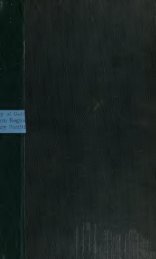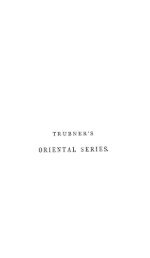Untitled
Untitled
Untitled
Create successful ePaper yourself
Turn your PDF publications into a flip-book with our unique Google optimized e-Paper software.
PRAISE OF AVICENN^. /<br />
should take up cpe cf the more detailed treatises, such as the .<br />
"<br />
Sixteen (Treatises," Sitfa l<br />
ashar) of Galen, ,or the, "Continens"<br />
>(Hdwty of Mohammad ibn Zakariyya, or the "Complete Prac-.^<br />
titioner" (Kdmilus-Sindfaty, or the "Hundred Chapters" (Sad<br />
3<br />
Bdb) of Abu Sahf Masi'hf or the , Qanun of Abu 'All ibn Sina<br />
(Avicenna) 4<br />
5<br />
or the Dnakhira-i-Kkwdrazm-shdht and read it in<br />
,<br />
,<br />
*<br />
his leisure moments of other<br />
;<br />
or, if he desires t6 be independent<br />
works, he may content himself with the Qdniin.<br />
The Lord (vv) of the two worlds and the Guide of the two<br />
"<br />
Grosser Races : says Every kind of game is in the belly of the<br />
wild ass 6 ": all this of which I have spoken is to be "found in<br />
the Qdniin, with much in addition thereto and whoever has<br />
;<br />
mastered the first volume of the Qdmln, to him nothing will be<br />
hidden of the general and fundamental principles of Medicine,<br />
for could Hippocrates and" Galen return to life, it were meet<br />
that they should do reverence to this book. Yet have I heard a<br />
wonderful thing, to wit that one hath take'n exception to Abu<br />
'All [ibn Sina] in respect of this work, and hath embodied his<br />
objections in a book, which he hath named " the Rectification of<br />
the Qdniin''"] and it is as though I looked at both, and perceived<br />
what a fool the author was, and how detestable is the book<br />
which he has ! composed For what right has anyone to find fault<br />
with so great a man when the very first question which he meets<br />
with in a book of his which he comes across is difficult to his<br />
comprehension ? For four thousand years<br />
*<br />
'<br />
79<br />
the wise men of an-<br />
tiquity travailed in spirit and melted their very souls in order to<br />
reduce the Science of Philosophy to some fixed order, yet could<br />
not effect this, until, after the lapse of this period, that ^comparable<br />
philosopher and most powerful thinker Aristotle weighed<br />
this coin in the balance of Logic, assayed it with the touohsttfne<br />
of definitions, and measured it by the scale of analogy, so that all<br />
doubt and ambiguity departed from it, and it became established *<br />
1<br />
This, known to mediaeval Europe as the " Continens," is the most detailed an 9<br />
most important of ar-Razi's works. The original Arabic exists only in manuscript,<br />
and that partially. The Latin translation was printed at Brescia in A.D. 1486, and in<br />
1500, 1596, 1509 and 1542 at Venice. See Note XXVII at the end, No. 4.<br />
2 This notable work, also known as al-Kitdbifl-Maliki( il'<br />
Liber Regius ") was composed<br />
by 'A!i ibnu'l-'Abbas al-Majiisi (" Haly Abbas " of the mediaeval physicians of<br />
Europe), who die^d in A.H. 384 (A.D. 994). The Arabic text has been lithographed<br />
at Lahore in A.H. 1283 (A.D / 1866) and printed at Bulaq in A.H. 1294 (A.D. 1877).<br />
There are two editions of the Latin translation (Venice, A.D. 1492, and Lyons,<br />
A.D. 1 5^3).<br />
3<br />
AVicenna's master, d. A.H. 390 (A.D. 1000). See Wiistenfeld, loc. tit., pp. 59-<br />
60, No. 1 18; p. Vf of the Persian notes; and Note XXVII, No. 9, at the end.<br />
4 See Note XXVII, No. 10, at the end.<br />
8 3ee Rieu*s Persian Catalogue, pp. 466-467.<br />
8 Meaning that every kind of game is inferior to the wild ass. It is said prove*rbi-<br />
ally ?f any crAe who excels his fellows. See Lane's Arabic Lexicon, p. 2357, s.v. IjJ.<br />
I<br />
I<br />
/








![La religione di Zarathustra nella storia religiosa dell' Iran [microform]..](https://img.yumpu.com/15970820/1/151x260/la-religione-di-zarathustra-nella-storia-religiosa-dell-iran-microform.jpg?quality=85)


